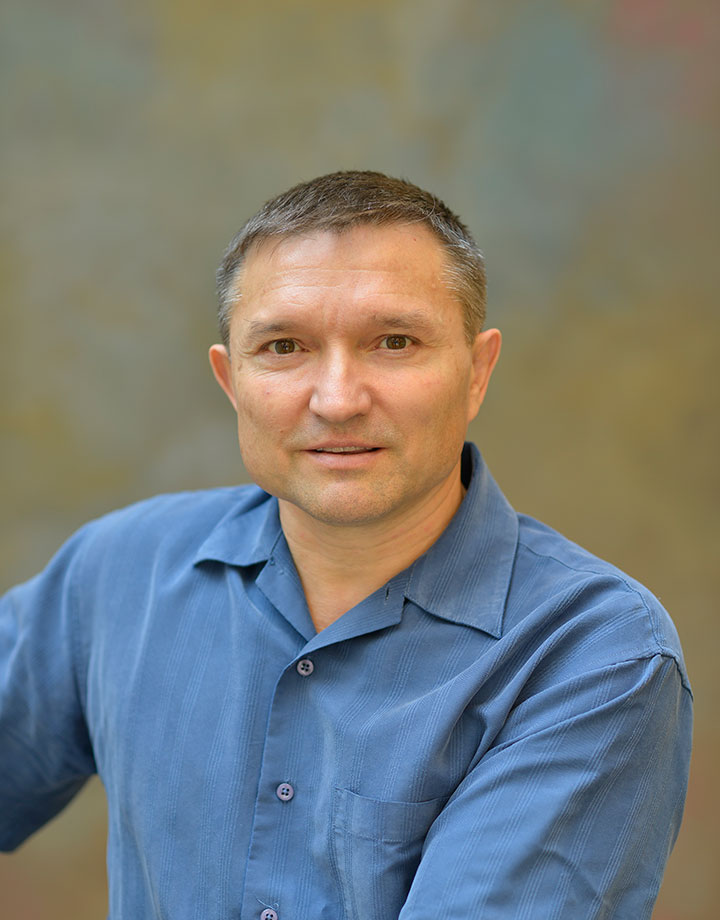National Science Foundation Grant Funds Fisher Nanoscience Research
Dr. Alexey Ignatchenko, associate professor of chemistry at St. John Fisher College, received a $213,652 grant from the National Science Foundation (NSF) to support a fundamental research study in catalytic reactions on surfaces with a potential to improve the production of biofuel.
The grant was awarded by the NSF Facilitating Research at Primary Undergraduate Institutions program and it was secured in collaboration with the College’s Office of Sponsored Programs. This is the first bench-research grant that Fisher has received from the NSF since 1998.
In his grant proposal, Ignatchenko noted that recent technological advances offer new ways of using traditional catalysts by reshaping their nano crystalline particles, exposing facets with the most useful reactive sites, and minimizing less desirable surfaces. His research project, “Mapping Catalytic Sites on Alkali Promoted Anatase Titanium Dioxide (TiO2),” seeks to fine-tune catalyst properties to maximize their effectiveness in the preparation of industrial chemicals and biofuels. Ignatchenko said the results of the study have the potential to lead to improvements in the efficiency-and cost-reduction of biofuel production.
Ignatchenko, who holds both a bachelor’s and doctoral degree from the University of Moscow, has a proven record of research in reactions on surfaces. He draws upon eight years of industrial experience and 12 years in academia. Additionally, he holds a dozen patents and has published two dozen research papers in reputable publications including Catalyst Today, ACS Omega, and the Journal of Physical Chemistry
To complete aspects of his research, Ignatchenko will collaborate with researchers at the Oak Ridge National Laboratory’s (ORNL) Center for Nanophase Materials Sciences, located in Tennessee, as well as the University of Rochester’s Nanosystems Center.
In summer 2019, Ignatchenko traveled to ORNL as part of the Department of Energy’s Visiting Faculty Program to hone research techniques using the Center’s specialized equipment. Fisher undergraduates Shane Rickard, Erik Akselrod, and Jordan Walker conducted research alongside Ignatchenko through various internship programs as part of this work.
His NSF research will provide similar experiences for Fisher students, engaging them in renewable energy studies. As a professor and researcher, Ignatchenko uses peer-to-peer mentoring, where students work both collaboratively and independently. As members of the research team, they will prepare plans for experiments, record data, and generate progress reports.
Students conducting research with Ignatchenko in the summer will also participate in Fisher’s Summer Research Fellows program, which includes seminars, workshops, and additional support from College faculty. The program provides opportunities for students to present their research findings at local, regional, and national levels.
“Engaging undergraduate students in high-quality chemistry research primes them to pursue a graduate degree or a career in a science, technology, engineering, or math-related industry,” said Ignatchenko.
Students will be trained in advanced methods of surface analysis, learning how the analytical information they obtain can improve our understanding of the catalyst structure at the molecular level and how this can control activity and selectivity of a catalytic process through tuning critical steps of the reaction mechanism.
“This experience—obtained at an early stage of their research career—will shape their future path and it will be very valuable for solving real-world problems and presenting conclusions to the larger scientific community,” Ignatchenko said.
This material is based upon work supported by the National Science Foundation under Grant No. 1955139. Any opinions, findings, and conclusions or recommendations expressed in this material are those of the author(s) and do not necessarily reflect the views of the National Science Foundation.
